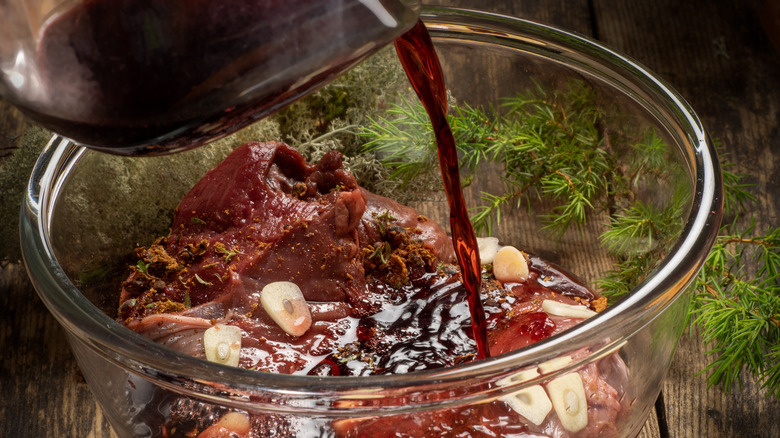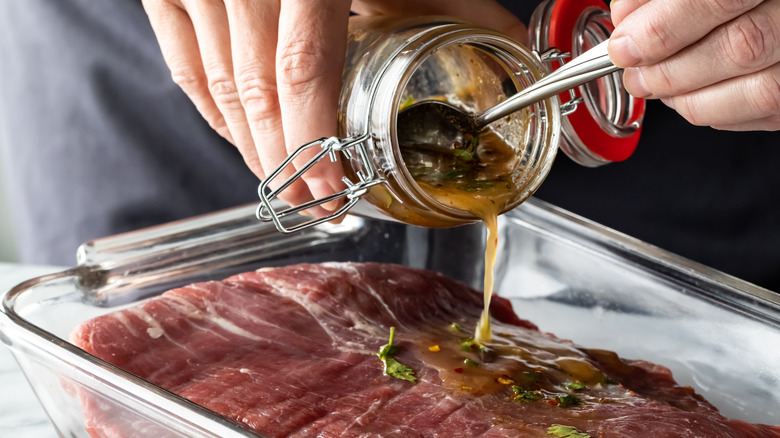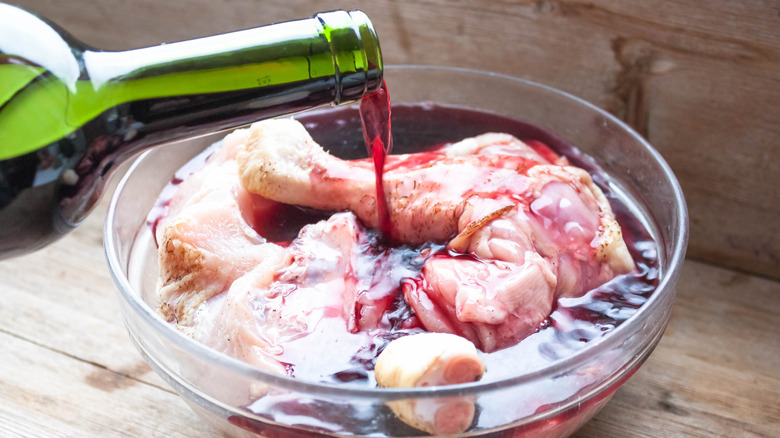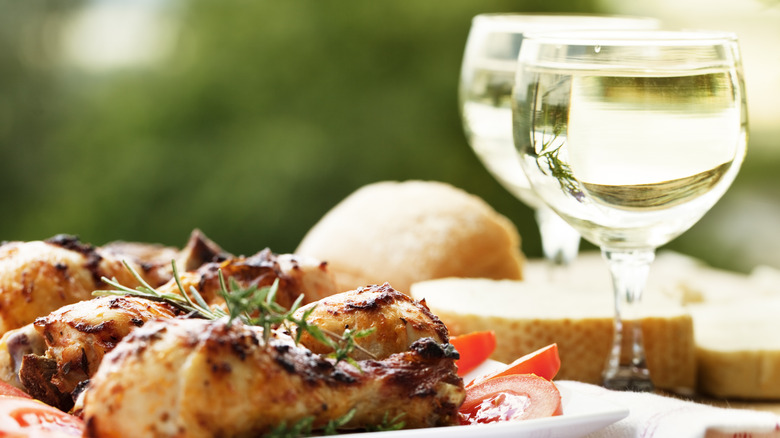How To Build A Quick Marinade From Any Leftover Wine
Maybe you had a party where a few too many bottles were opened and left behind, or perhaps thought you'd open a bottle for one more glass and realized partway through that a glass of water was a better bet. Most unfortified wines do not last more than five days after opening, less for richer wines, and maybe a day or two more for light, low-sugar wines. You can drink it quickly, but if you are after another use, look no further than your next protein preparation.
You can use wine as the base for a flavorful marinade. A basic marinade requires acid, fat, and salt. Adding sweet components, spices, and aromatics enhances a marinade. When choosing a cooking wine, consider what you would want to drink with whatever dish you are preparing and how the body of the wine will stand up to your protein. Marinades will only penetrate a few millimeters into the protein, so selecting thinner cuts is ideal.
Why does wine make a good marinade base?
Wine works well here because it contains tannins, sugar, and acid, providing flavor depth. Tannins are the phenolic compound responsible for that mouth-drying feeling and impart a slight bitterness. They are naturally occurring in not just grapes, but tea, coffee, dark chocolate, cranberries, walnuts, various tree barks, and more. In a marinade, bitterness equals complexity, and tannins themselves help tenderize your protein.
Acid too helps tenderize as well as balance the richness of the meat. All wines have some degree of acidity, but it is best to select a lower-acid wine for a marinade. Too much acid can cause the protein to get mushy on the surface and tough and dry on the inside. Use a ratio of one part acid (wine) to three parts fat (typically oil). If you have an acidic-leaning wine you want to try in a marinade, decrease the marination time, and balance the marinade with additional sugar. In fact, it is always best to taste your marinade for seasoning and balanced flavors before adding the protein.
Sugars provide flavor and balance, and aid in browning down the road. Adding dry spices, fermented pastes and sauces, fresh herbs, alliums, condiments, and syrups can really make your marinade shine. When crafting a marinade, combine salt, neutral oil, and wine, and then get creative. Choose ingredients that compliment the existing flavor palate of the wine.
What works well for a red wine marinade?
In general, the lighter the body, the higher the acid. Avoid pinot noir, sangiovese, or gamay, and instead look toward fuller-bodied reds like a cabernet sauvignon, merlot, carmenere, zinfandel, grenache, or malbec.
Try Korean gochujang, soy sauce, and sesame oil for an umami bomb. Go classic French with thyme, bay leaves, and pearl onions. Take inspiration from an Indian vindaloo with garlic, coriander, chilies, cinnamon stick, and jaggery.
Beef is the obvious choice for a red wine marinade, but dark meat chicken, lamb, goat, and fatty pork belly would be great too. Marinate for 4 – 6 hours. Mushrooms would benefit from a quicker half-hour red wine soak, but earthy and sweet vegetables like beets and butternut squash could marinate for six hours. You can pop your marinated main with the liquid and some broth or water into the oven to cook low and slow, braise on the stove top, or pat the protein dry to pan-sear.
Even a hearty fish like tuna could marinate in red wine for a couple of hours. Grill to add extra charred richness, but keep it rare, similar to a filet mignon. Finish with a simple reduction. Cook your red wine marinade on low heat in a saucepan until it coats the back of a spoon, and whisk in a couple of pats of butter at the end for a velvety finish.
How to make a marinade with white wine
Select fuller-bodied whites like chardonnay, viognier, gewürztraminer, semillon, or marsanne, and avoid acidic wines like riesling, pinot grigio, and sauvignon blanc. Orange wines too would be lovely. Orange wines allow for a period of skin contact fermentation, a similar process to making red wine, but with white grapes. The result is typically more complex, tannic, and herbal than most white wines.
For proteins, consider chicken, lean cuts of pork, veal, fish, or shrimp. Cauliflower, asparagus, green beans, snap peas, and broccoli would also work well. Heartier proteins can marinate for up to four hours, sturdy fish and vegetables for up to two, and more delicate proteins like shrimp should take between 30 minutes to one hour.
Consider scallions, assorted tender herbs, lime zest, and fresh chilies along with your wine of choice. Marinate pork in white wine, fish sauce, garlic, palm sugar, and fresh cilantro. Take inspiration from shrimp scampi and add white wine, lemon zest, garlic, and parsley to a marinade for not just shrimp, but salmon, chicken, or vegetables as well. Try out an orange wine marinade on a hearty white fish like swordfish with fresh fennel, honey, and orange zest.
Cook your marinated protein or vegetable in the oven, char-grill, or sauté. For a light and bright finish, reserve some of the marinade before adding the protein and drizzle on the cooked dish. Get creative! And never let a bottle of wine go to waste again.




